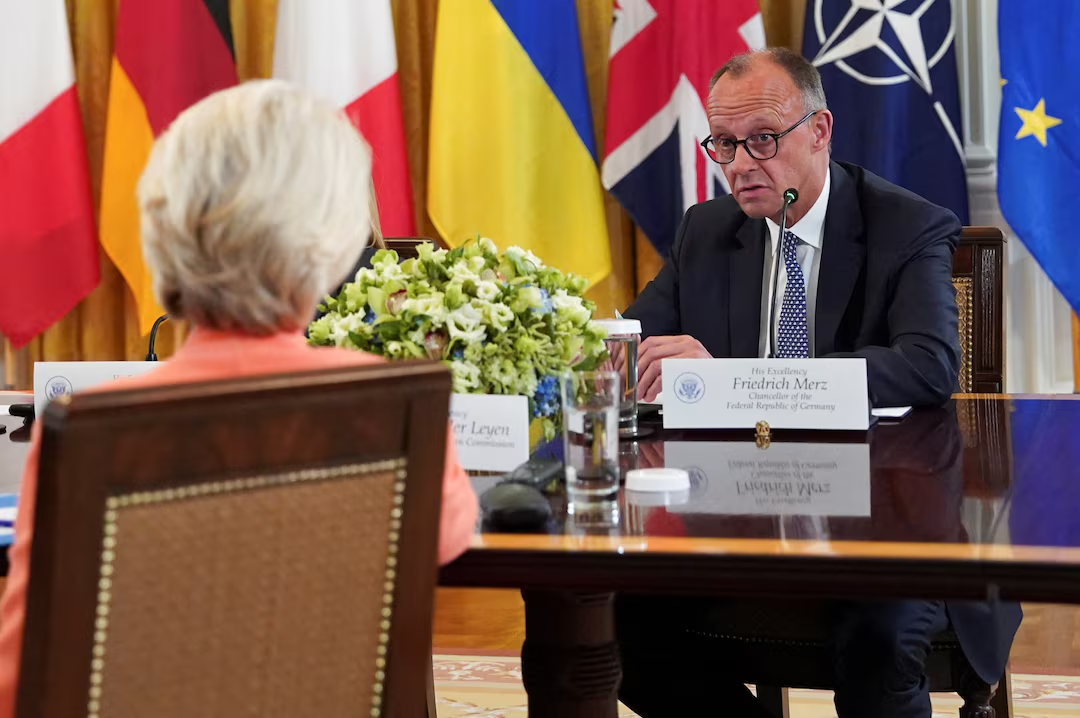Germany Divided Over Talk of Peacekeeping Troops in Ukraine
Chancellor Friedrich Merz has signaled openness to German participation in such a mission but stressed that any deployment would require coordination with European partners and a Bundestag mandate — a high hurdle for a leader who himself only secured office on the second parliamentary vote.
Germany Divided Over Talk of Peacekeeping Troops in Ukraine
Discussion among Western allies about deploying European peacekeeping forces to Ukraine as part of a potential post-war settlement with Russia has sparked sharp unease in Germany, a nation still haunted by its militaristic Nazi past.
Chancellor Friedrich Merz has signaled openness to German participation in such a mission but stressed that any deployment would require coordination with European partners and a Bundestag mandate — a high hurdle for a leader who himself only secured office on the second parliamentary vote.
Russia has already voiced strong opposition to the presence of NATO troops in Ukraine, and analysts note it remains far from clear how a peacekeeping force could operate without escalating tensions.
Political Backlash at Home
The debate has exposed divisions inside Germany. Alice Weidel, leader of the surging far-right Alternative for Germany (AfD), slammed Merz’s conservatives for even considering the idea, calling it “dangerous and irresponsible.”
Even Foreign Minister Johann Wadephul cautioned that sending troops “would probably overwhelm us.” Critics cite Germany’s historical baggage and more recent foreign missions in Afghanistan and Mali — widely seen as failures — as reasons for public skepticism.
Meanwhile, frustration is growing over billions spent on military aid to Ukraine while the German economy struggles. Policymakers also worry about overstretching the Bundeswehr, which has long faced criticism for underfunding and shortages.
“Something like this is obviously extremely controversial in Germany,” said Marcel Dirsus, Non-Resident Fellow at the Institute for Security Policy at Kiel University. “The government will tread very carefully. There is no point expending political capital on something that might not actually come to pass.”
Merz Under Pressure
Merz, who took office earlier this year pledging to make Germany’s armed forces the strongest in Europe, is navigating politically treacherous waters. His popularity has waned since the election, while the AfD — which has adopted Russia-friendly positions and opposes weapons deliveries to Ukraine — is now leading national opinion polls.
The AfD has seized on the issue, posting an image on social media depicting Merz above young soldiers with the caption: “Merz wants to send YOU to Ukraine? We don’t!”
A Nation Split
The debate is not limited to Germany. French President Emmanuel Macron and UK Prime Minister Keir Starmer have expressed support for troop deployments in a potential post-war settlement. But German public opinion is far more divided.
A Forsa poll for RTL/ntv found 49% of Germans would support sending troops as part of a European peacekeeping force, while 45% opposed it — far weaker support compared to Britain and France. Scepticism is strongest in eastern Germany, where three states hold elections next year.
Sven Schulze, CDU leader in Saxony-Anhalt, admitted the Bundeswehr is “barely in a position” to deploy troops, arguing instead for building “a strong European security architecture.”
The Social Democrats, Merz’s coalition partners, are also largely opposed. “Germany should stay out of this matter,” said SPD lawmaker Ralf Stegner, citing both historical reasons and fears of escalation.
Still, others within the CDU, such as defense committee chair Thomas Roewekamp, believe German forces may ultimately be necessary if a permanent ceasefire is reached. “To make deterrence credible, we must have military capabilities,” he said.
For now, Merz remains cautious. Asked directly about deploying troops, he said on Monday: “It is too early today to give a definitive answer.”










